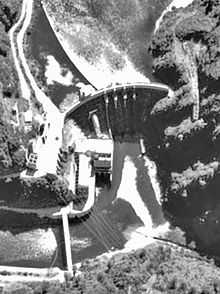Otori Dam
| Otori Dam | |
|---|---|
 The dam in 1976 | |
 | |
| Country | Japan |
| Location | Tadami |
| Coordinates | 37°12′53″N 139°12′50″E / 37.21472°N 139.21389°ECoordinates: 37°12′53″N 139°12′50″E / 37.21472°N 139.21389°E |
| Status | Operational |
| Construction began | 1961 |
| Opening date | 1963 |
| Owner(s) | Electric Power Development Company |
| Dam and spillways | |
| Type of dam | Arch-gravity |
| Impounds | Tadami River |
| Height | 83 m (272 ft) |
| Length | 188 m (617 ft) |
| Reservoir | |
| Total capacity | 15,800,000 m3 (12,809 acre·ft) |
| Active capacity | 5,000,000 m3 (4,054 acre·ft) |
| Catchment area | 656.9 km2 (254 sq mi) |
| Surface area | 89 ha (220 acres)[1] |
| Power station | |
| Commission date | 1963, 2003 |
| Hydraulic head |
Unit 1: 50.8 m (167 ft) Unit 2: 48.1 m (158 ft) |
| Turbines | 1 x 95 MW, 1 x 87 MW Kaplan-type |
| Installed capacity | 182 MW |
The Otori Dam (大鳥ダム Ōtori damu) is a concrete arch-gravity dam on the Tadami River, 17 km (11 mi) southwest of Tadami in Fukushima Prefecture, Japan. The primary purpose of the dam is hydroelectric power generation and it supports a 182 MW power station. The power station contains two Kaplan turbine-generators. Unit 1 (95 MW) was commissioned on 20 November 1963 while Unit 2 (87 MW) was commissioned on 7 June 2003 as part of a power plant expansion project that included an additional 200 MW generator at Okutadami Dam upstream. The dam is 83 m (272 ft) tall and 188 m (617 ft) long. Its reservoir has a 15,800,000 m3 (12,809 acre·ft) capacity of which 5,000,000 m3 (4,054 acre·ft) is active (or "useful") for power generation. The reservoir has a catchment area of 656.9 km2 (254 sq mi) and surface area of 89 ha (220 acres). Of the two generators, Unit 1 has a maximum effective hydraulic head of 50.8 m (167 ft) and Unit 2 is afforded 48.1 m (158 ft). The design flood discharge of the dam is 2,200 m3/s (77,692 cu ft/s) and its service spillway is controlled by three tainter gates.[2]
See also
- List of power stations in Japan
- Tagokura Dam – located downstream
References
- ↑ "Otori Dam" (in Japanese). DamMania. Retrieved 15 August 2011.
- ↑ "Case study 01-02: Biological Diversity - Okutadami and Ohtori Expansion Hydropower Project, Japan". IEA Hydropower Implementing Agreement Annex VIII: Hydropower Good Practices: Environmental Mitigation Measures and Benefit. New Energy Foundation. 2006. Retrieved 14 August 2011.